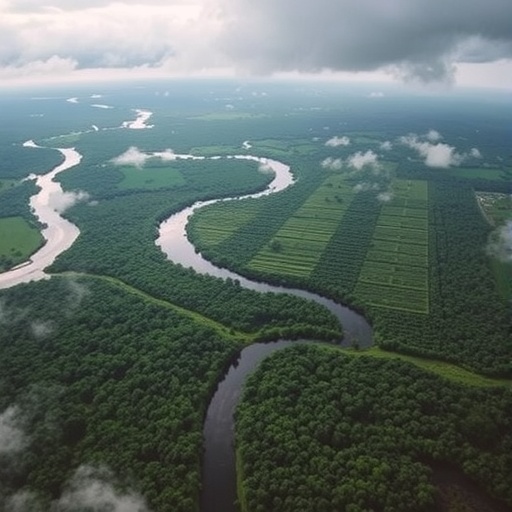Recent research has uncovered alarming insights into the dynamics of fluvial flooding, particularly in the context of deforestation and forest fires. A groundbreaking study conducted by experts Kang, TH., Sharma, A., and Marshall, L., published in the journal “Commun Earth Environ”, has illuminated the interconnectedness between forest health and flood risks, signaling a critical warning for communities worldwide. The study articulates that a reduction in natural interception—caused by the decimation of forests—significantly amplifies risks of large-scale flooding events. This revelation demands immediate attention, given the escalating rates of forest loss globally.
The study presents a stark narrative that emergency response systems and water management strategies may need a substantial rethink as the implications of increased flooding risk could have devastating effects on urban and rural regions alike. Deforestation and forest fires reduce the ability of ecosystems to capture and manage rainfall effectively. With forests serving as natural buffers, their removal puts additional strain on waterways, which may already be burdened by climate change impacts. This loss of forest cover not only affects local biodiversity but also has far-reaching consequences for hydrological cycles.
In evaluating the effects of deforestation, the authors underline the alteration of hydrological processes that play a crucial role in maintaining ecological balance. Forests are vital for intercepting precipitation, meaning they capture rainwater and slow its movement into waterways. This process minimizes the speed and volume of runoff that could otherwise overwhelm river systems. The study quantitatively delineates how each tree felled or burned increases the velocity and quantity of water rushing into rivers, thereby heightening erosion and sedimentation in river systems. Such changes drastically increase the likelihood of flooding events in downstream areas.
The research further highlights how these phenomena disproportionately affect vulnerable communities. Low-income areas, often situated near riverbanks, are at the mercy of increased flooding risks exacerbated by land-use changes driven by deforestation. This intersection of environmental degradation and social vulnerabilities creates a cycle of poverty and environmental injustice that is hard to break. Regions with a weakened ecological framework struggle not only to manage water effectively but also to navigate the socio-economic challenges that follow an increased incidence of flooding.
Adding urgency to these findings is the projected escalation of extreme weather events linked to climate change. As global temperatures continue to rise, extreme weather patterns become more frequent, leading to heavy rainfall events that exacerbate flooding risks. Without the protective nature of forests, these areas may face catastrophic outcomes, illustrating the need for restoration projects focused on reforestation. The restoration of tree cover can play a pivotal role in reversing some of the effects of deforestation, providing the necessary canopy structure to once again regulate local climates and water flows.
The implications of Kang and colleagues’ research extend beyond theoretical frameworks; they provide concrete calls to action for policymakers. It encourages leaders to consider ecosystem services in their urban planning and land management strategies. By recognizing forests not merely as areas for timber extraction but as living infrastructures that contribute to water management, policymakers can implement more sustainable practices that incorporate nature-based solutions in urban environments.
Moreover, the coupling of technology with ecosystem management offers potential avenues for innovative solutions. Implementing sophisticated monitoring systems that track changes in forest cover and hydrological responses could help anticipate flood risks more accurately. These predictive models would allow communities to prepare in advance for potential flooding events, potentially saving lives and economic resources.
In addition, community engagement becomes crucial in addressing these issues. Awareness campaigns that educate local populations on the importance of preserving forest ecosystems can foster sustainable practices. This grass-roots movement can further inform conservation efforts and promote stewardship towards natural resources. The interplay between local communities and forest conservation initiatives can create a robust network of support, driving home the importance of preserving ecological health in the face of rapid industrialization.
Despite the grim forecast presented in the study, there is a silver lining; if global society acts responsibly and decisively, it can mitigate the impacts of flooding instigated by deforestation. The findings mark a clarion call for renewed efforts towards forest conservation, emphasizing that the health of global forests is intrinsically linked to the resilience of communities. Interventions focusing on sustainable land management, reforestation, and a commitment to reducing emissions can help heal our planet.
In summary, Kang and his collaborators provide a critical insight into environmental science that speaks volumes about the ripple effects of deforestation and forest fires. As urbanization continues to encroach on forested areas, systemic changes must be implemented to value and conserve natural ecosystems. Addressing deforestation is not only an environmental issue but is also vital for managing risks associated with increasing flood events, chiefly amid a changing climate. Through collaborative efforts that integrate science, policy, and community action, the trajectory towards a sustainable future can be changed, one tree at a time.
The integration of these findings into global discussions around climate action represents a significant achievement in environmental research. Awareness of this issue must permeate all levels of society to ensure that future generations inherit a balanced ecosystem capable of supporting life in its myriad forms. The narrative defined by Kang et al. thus serves as both a warning and a pathway to proactive engagement in environmental stewardship.
Subject of Research: Interception Reduction from Deforestation and Forest Fire Increases Large-Scale Fluvial Flooding Risk
Article Title: Interception reduction from deforestation and forest fire increases large-scale fluvial flooding risk
Article References:
Kang, TH., Sharma, A., Marshall, L. et al. Interception reduction from deforestation and forest fire increases large-scale fluvial flooding risk. Commun Earth Environ 6, 779 (2025). https://doi.org/10.1038/s43247-025-02748-6
Image Credits: AI Generated
DOI: 10.1038/s43247-025-02748-6
Keywords: deforestation, flood risk, forest fire, hydrology, ecosystem services, climate change, reforestation, environmental justice




